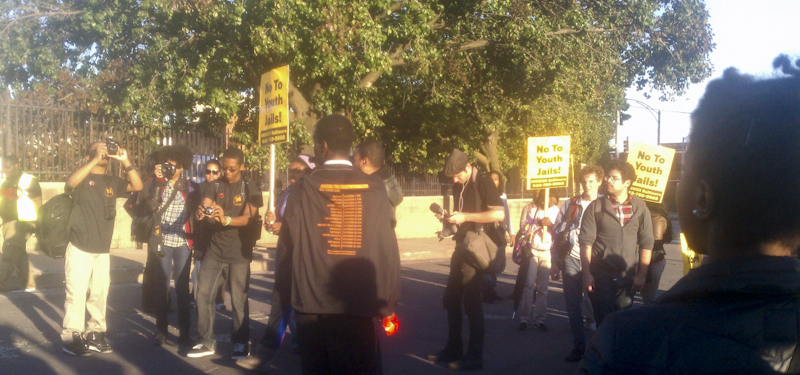
Crowds gathered outside the Baltimore City Detention Center to rally support for the sixth annual National Youth Justice Awareness Month.
This October marks the fourth annual National Youth Justice Awareness Month. The month long program, sponsored by the Campaign for Youth Justice, involves activities and events across the United States that are centered on raising awareness and civic involvement with youth justice issues, primarily the incarceration of minors in the prison system of the nation.
National Youth Justice Awareness Month was created by Tracy McClard, a Missouri mother whose 17 year-old-son committed suicide while incarcerated in an adult prison. McClard, who now runs the organization Families and Friends Organizing for Reform of Juvenile Justice, said that she began the program as a means to raise awareness about the incarceration of minors in the United States.
“One reason why we started the National Youth Justice Awareness Month is because [the general public] doesn’t understand what it’s like to have a child in jail at all,” McClard said. “If you don’t know what it’s like, it’s real easy to approve of policies that you don’t understand or know the statistics about.”
Advocates for reform also point to statistics showing the number of youth in detention. This week, for example, the Annie E. Casey Foundation issued a new report on juvenile detention in the United States. The report, No Place for Kids: The Case for Reducing Juvenile Incarceration, details the enormous cost associated with detaining tens of thousands of young people each year.
“The United States leads in incarceration of everybody,” said Campaign for Youth Justice Media Director Eric Solomon. “There [are] a quarter million youth tried, sentenced or incarcerated as adults every year in the United States. Just in the jail system, on any given day, there’s about 7,500 kids, pre-trial, in jails.”
Speaking from his Washington, D.C. office, Solomon said the lack of knowledge about the incarceration of minors in the nation goes beyond the scope of the general public to encompass policymakers as well.
“Some policymakers want to look tough on crime, but research shows another thing,” he said. “I think it’s a matter of seeing what research has been done and revisiting that again as we’re starting to see states across the country change their policies.”
McClard encouraged those in favor of adult sentencing for minors to examine recent data and statistics. “Look at the studies, everything that’s out there,” she said. “It doesn’t make society safer and it doesn’t make the public safer.”
“It damages families, it damages youth, and there is nothing positive about it,” McClard stated. “Everything about it is wrong.”
McClard, who is based in Missouri, said she is pleased with the growth in National Youth Justice Awareness Month involvement over the last four years. “It started off with one state, and four years later, we have 16 states. The goal is to have it in all 50 states, so it’s never too late [for volunteers and organizers] to jump on board.”
McClard said she hopes event attendees do more than simply participate in National Youth Justice Awareness Month activities. She said that while she would like to see people show support for the program, she believes it is far more important for participants to understand the realities of juvenile incarceration and youth justice policies in the United States.
Solomon said that the Campaign for Youth Justice is “thrilled” to be a part of the national effort.
“Just seeing all these states grow each year really shows that there is interest in this issue and that many people want to change things and reform policies,” Solomon said. “As it continues to grow each year, and the awareness continues to grow, we hope that the trends in each state can grow as well as far as changing their policies toward trying kids as adults.”
Photo credits: Campaign for Youth Justice

